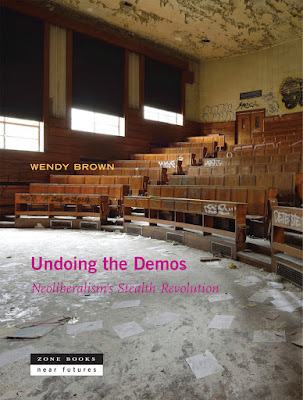Neoliberalism's destructive influence both inside and outside the modern Unitarian movement
 |
| Wendy Brown's recent book on neoliberalism |
However, I concluded my presentation with the following few paragraphs which, much to my surprise, generated way more interest than I expected. So, in case they are of any interest to anyone else, here they are again.
To my mind, liberal religion in general, and the British Unitarian GA in particular, has been thoroughly infected by neoliberalism and somehow, though goodness knows how, we really need to try to set up some kind of resistance movement. As I said on the day, the following thought will make immediate sense to some but not to all. If it doesn't make immediate sense to you then please follow-up the introductory links found at the end.
In addition to working on this recent project with Susanna Hartland (who ran our campus ministry project), my own experiences as a chaplain at Cambridge University, Anglia Ruskin University and in the Police, as well as a teacher of Jewish-Christian-Muslim relations at the Woolf Institute and jazz and rock bass at Anglia Ruskin over the last 17 years, I have become more convinced than ever that the idea of the human-self gifted to us during the Enlightenment, and which decisively shaped our own radical, liberal freethinking religious tradition, has changed in a deeply unhealthy and disturbing way. As a religious movement we seem still to be failing to notice that this revolutionary change has occurred in our wider culture and in our own circles.
The conception of the human self being held by more and more people born later than the late 1980s and early 1990s has perhaps best been described as the neoliberal self and this has no better and more succinctly articulated than by Wendy Brown, a Professor of Political Science at the University of California, Berkeley. According to her analysis (with which I agree and which draw heavily upon below):
Neoliberalism is the governing rationality through which everything is “economized” and in a very specific way: human beings become market actors and nothing but, every field of activity is seen as a market — including church going — and every entity (whether public or private, whether person, business, or state) is governed as an entrepreneurial firm. Neoliberalism has now successfully turned a frighteningly large number of people — and in my experience that includes a very high percentage of students — into the equivalent of little entrepreneurial firms who are more concerned with their own speculatively determined value, their ratings and rankings that shape their imagined future value, than they are with any immediate outcomes or actually existing community — religious, political or otherwise. Often at an extremely high cost to their mental health and sense of well-being (a real issue in any student ministry), the neoliberal self is concerned to enhance their own present and future value by, for example, increasing or maintaining personal ratings through blog hits, Facebook likes or Twitter retweets. Consequently, loyal, long-term, committed engagement with a radical religious community such as ours in Cambridge that is seeking strongly to resist such a neoliberal self-understanding and the use of these kinds of market metrics for everything is often neither attractive to many modern students nor, alas, makes much sense to them.
Anyway, the two-dozen or so undergraduates and graduates who have most fully engaged with us over the 17 years of my own ministry are without exception precisely those who have woken up to the deep structural dangers to society presented by neoliberalism and who have sought us out as a creative and potentially healing site of resistance to this dreadful, all-encompassing new way of being. But in the current neoliberal world these brave resisters will for the present remain very few and far between. Nevertheless, we should be trying to let them know we exist and, at its best, I think our campus ministry did just that.
If you want to read up a little more on neoliberalism below are a few useful links:


Comments